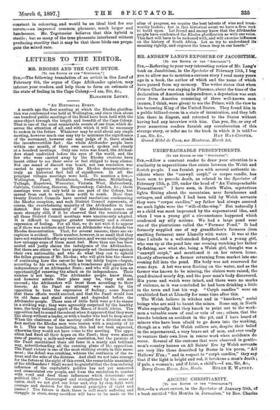UNIMPEACHABLE PRESENTIMENTS.
[TO Till EDITOR OF THC " SPECTATOR"] SIR,—Allow a constant reader to draw your attention to a similarity in superstitions that exists between the Welsh and Scotch people. I can furnish you with several authentic in- cidents where the "canwyll corph," or corpse candle, has been seen to precede death, as related in the Spectator of February 13th, p. 238, under the head of "An Unimpeachable Presentiment." I have seen, in South Wales, mysterious lights flitting about the mountains, near farmhouses and cottages, and although I bad been told by Welsh servants they were " corpse candles," my father had always assured me such lights were the " will-of-the-wisp." But naturally I as a child was most impressed by the supernatural idea, and when I was a young girl a circumstance happened which confirmed my silly notions. We had a large pond near one of the plantations called the " Furnace Pond." It had formerly supplied one of my grandfather's furnaces (iron smelting furnaces) near Llanelly with water. It was at the time I allude to a well-stocked fishpond, and a young girl, who was up at the pond late one evening watching her father fly-fishing, saw what she, being a Welsh girl, thought was a "canwyll corph," and mentioned it on her return home. Shortly afterwards a farmer returning from market late one evening fell into the pond. His body was not recovered for some days. A hat was seen floating on the water, and as the farmer was known to be missing, the sluices were raised, the pond drained nearly dry, and the poor man's body discovered. His purse and watch were intact, and there were no marks of violence, so it was concluded he had been drinking a little in the town and lost his way. " Corph candles " were an established fact at Llanelly for some time after this.
The Welsh believe in witches and in "knockers," aerial beings who are said to haunt the mines. Some say, in North Wales especially, that they knock to point out to the work- men a valuable seam of coal or vein of ore ; others, that the knocks betoken an accident in the pit, and I have heard of miners who have been afraid to go down into the working, though as a rule the Welsh colliers are, despite their belief in the supernatural, a very brave set of men, and ever ready to venture their own lives in rescue work when accidents do occur. Several of the customs that were observed in gentle- men's country houses on All Saints' Eve by Welsh servants are very like those described by Burns in his poem, "All Hallows' E'en ; " and in respect to " corph candles," they say that if the light is bright and red, it betokens a man's death ; if pale, a woman's; and if faint, a child's.—I am, Sir, &c.,






































 Previous page
Previous page